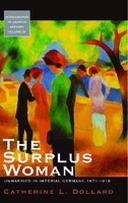Explore

The first German women’s movement embraced the belief in a demographic surplus of unwed women, known as the Frauenüberschuß, as a central leitmotif in the campaign for reform. Proponents of the female surplus held that the advances of industry and urbanization had upset traditional marriage patterns and left too many bourgeois women without a husband. This book explores the ways in which the realms of literature, sexology, demography, socialism, and female activism addressed the perceived plight of unwed women. Case studies of reformers, including Lily Braun, Ruth Bré, Elisabeth Gnauck-Kühne, Helene Lange, Alice Salomon, Helene Stöcker, and Clara Zetkin, demonstrate the expansive influence of the discourse surrounding a female surfeit. By combining cultural, social, and gender history, The Surplus Woman provides the first sustained analysis of imperial Germans' anxiety over female marital status as both a product and a reflection of changing times.
This book is included in DOAB.
Why read this book? Have your say.
You must be logged in to comment.
Rights Information
Are you the author or publisher of this work? If so, you can claim it as yours by registering as an Unglue.it rights holder.Downloads
This work has been downloaded 141 times via unglue.it ebook links.
- 141 - pdf (CC BY-NC-ND) at OAPEN Library.
Keywords
- Berlin
- bourgeoisie
- European History
- History
- history of feminism
- Humanities
- Imperial Germany
- Middle class
- modernity
- Regional & national history
- thema EDItEUR::N History and Archaeology::NH History::NHD European history
- women's history
- women's movement
Editions

